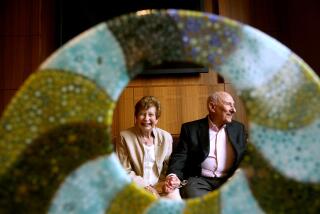UCLA Scholar Thrives on Double Major
- Share via
Todd Squires’ academic transcripts border on the fourth dimension.
The 22-year-old UCLA student recently completed a double major, graduating with a 3.97 grade-point average in both physics and Russian literature.
During one quarter, Squires took three courses in Russian, including advanced Russian-language studies and a Russian literature class, added a physics course and a physics laboratory for good measure--and earned A’s in all of them.
Talk about left brain/right brain.
To top it off, Squires recently became one of 10 students nationwide to win a prestigious Winston Churchill Foundation Scholarship at Cambridge University, where he will begin graduate work in September in applied mathematics and theoretical physics.
After spending last fall studying in Moscow, Squires, who is fluent in Russian, will return there this summer before heading to England.
“Most people tend to pursue one subject, but I’ve found that studying two separate areas allows you to use one as a study break for the other,” he said. “It allows the use of two different parts of your brain--after an intense bout with a problem set in physics, I can step back and study Russian poetry for a while. It’s nice to have two things in my brain to toggle back and forth.”
Squires has traveled quite a distance since growing up in New Holstein (population: 3,012), a rural town in Wisconsin that once held a parade to celebrate the installation of a second stoplight. Now he seems destined for a life of world travel.
In addition to the one-year, $20,000 Churchill scholarship, Squires also won a $1,000 UCLA College of Letters and Science Undergraduate Award, a $2,000 UC Regents Scholarship and a $1,500 scholarship from Litton Industries, a Woodland Hills-based advanced electronics and defense systems company.
After his overseas study, the budding scientist--who enjoys the 19th-Century Russian poet Aleksandr Sergeyevich Pushkin--plans to pursue a doctorate in physics at an American university.
Squires has already met with Russian physicists and hopes to work with researchers around the world.
“The Russian literature will always stick with me--I’ve still got a lot of books,” he said. “But there’s such a big move to joint ventures between the Russians and us [in the United States] that I can see myself merging the two eventually--working toward international science cooperation.”





